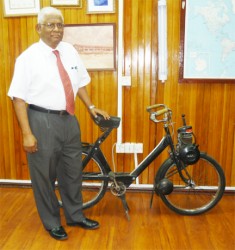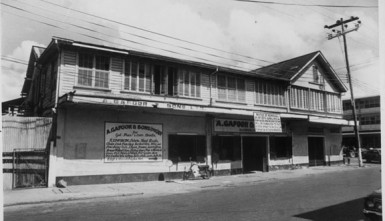Every working day Sattaur Gafoor climbs 33 stairs to get to the third-floor office of the Houston building housing his business complex, a not inconsiderable task for a man who, two Wednesdays ago, celebrated his 73rd birthday.
But the Executive Chairman of Gafsons Enterprise has the sturdy appearance of a man who is used to the peaks and troughs of business.
Gafsons is now in its 60th year and Sattaur Gafoor has been an integral part of it for the vast majority of those years. Its story, we found, was a more than interesting one.
Of all the questions put to one of Guyana’s best-known entrepreneurs his most profound response was to the one that sought a time-frame for his retirement. “Until I die,” was his answer. “They will bury me in this place, unless I become mentally incapacitated.” The symbolism in his response does nothing to disguise the fact that he is dead serious about working to the end.
A year ago, in deference to the fact that he is getting on in age, Gafoor altered his work routine. What he did was to reduce his hours of work. These days, he ends his working day at 19:00 hrs. A year ago, work stopped at 21:00 hrs. He rises at 04:00 hrs, prays then joins his wife for a chat. Sometimes they have breakfast together. Afterwards, he turns his attention to work.

Much of his working day is spent seeking to enhance the professional development of his staff. Many of them are university graduates, but Gafoor knows what he wants out of his employees and he believes he is the fittest person to provide that guidance.
His chosen model of management allows for clear cut delegation of responsibility that affords him the luxury of not having to continually watch over what is a huge operation. Gafsons is run by a Board of Directors and each of its 13 divisions has its own manager. They function with full autonomy and are, in the final analysis, accountable for the outcomes of their respective slices of the Gafsons ‘cake’. Come January, each of the firm’s 1,000 employees will sign a contract that will provide details of salaries, incentives and bonuses, to be paid around November 15. Advance knowledge of rewards based on performance can be a compelling incentive.
For a man who has the final say in the running of such a vast business enterprise Gafoor manages in a manner that appears to focus primarily on simplicity and clarity. The company’s operations, he says, are fuelled by three principles: rigid adherence to deadlines, a recognition that excuses do not compensate for failure and the importance of employing effective communication as an operational tool. He attributes his business principles to the teachings of JC Loncke, his headmaster at Central High School more than half a century ago.
Family business
Gafoor has challenged himself and his company to meet the rapidly growing needs of a country where construction is one of the fastest growing sectors. Gafsons has made its mark as much in manufacturing as in importing a range of products required in the construction sector.
At one end of the spectrum, the company offers solar panels (primarily to the mining community) water tanks, steel rods and chain link fencing. At the other end it offers basic building products including nails and screws. As far as the building industry is concerned, it is the proverbial one-stop shop. Some of his personnel policies derive from his own manual. He is wary of the kind of nepotism that can sometimes arise out of family businesses. His three sons all reside abroad and none of them hold positions in the company. The exception here is his wife, Ameena, a member of the Board, whom he says, has been a considerable inspiration over the years.
Sattaur Gafoor was born on the May 22, 1942. He spent his formative years at Number 59 Village, Corentyne. In 1953, the year in which the British Guiana Constitution was suspended, his father, Abdool Gafoor, moved to Georgetown with his entire family. There, he established a small lumber dealership on Lombard Street. Sattaur Gafoor recalls the tense political times of the era and the presence of members of the famous ‘Black Watch’ regiment on the streets of Georgetown.
Sattaur received his secondary education at Central High School and recalls that the now deceased educator and trade unionist, T Anson Sancho was one of his teachers. It was at Central High, too, that he first met his wife. They were married on July 29, 1963 and the union produced three sons, Omar, Arif and Rafael.
Upon leaving school in 1959, Gafoor joined his father in business. In those days, he says, it was the expectation that the eldest son would become part of the family business. By the time he became part of the business it was already beginning to show signs of growth.
Gafoor recalls the gesture made by the William Smith Shipping Company that afforded his father’s company its first line of credit which allowed for the importation of a quantity of cement from the United Kingdom. The family still does business with that company.
With trading controlled by the expatriate heavyweights that included Bookers, Sandbach Parker and JP Santos, breaking into key markets during the 1950s was difficult. In those days, Gafoor says, the sugar estates were the major buyers and the expatriate suppliers benefited most from that market.
Gafoor also recalls what he says was a decision made in 1960 by the then premier of British Guiana, Dr Cheddi Jagan to remove the requirement of a license to import (cheaper) goods from the socialist bloc. In those days, he says, goods imported from the west – and primarily from the UK – enjoyed a preferential rate of duty. Access to goods from the socialist bloc, Gafoor says, enabled small businesses to compete more effectively on the local market.
Barbados and the Caribbean

The political vision of an enhanced post-independence economy and the call by the then political administration in 1970 for the country to enhance its manufacturing capacity met with a positive response from the Gafoors. The company began to manufacture louvre panes. “It was quite a success as we were able to export to all of the Caribbean countries; all the way to Jamaica,” Gafoor says.
During the 1971-1972 period the company began to manufacture re-enforced fabrics, nails, the latter being a response to high freight costs associated with the importation of such material. Here, Gafoor’s was also opening new manufacturing vistas for Guyana, taking advantage of the fact that there were only two plants in the Caribbean – one in Jamaica – manufacturing such material. Afterwards, Gafoor’s moved on to the manufacture of corrugated zinc sheets which are exported across the Caribbean.
The emerging economic hardships of the mid-1970s and the attendant shortage of foreign exchange led to the introduction of licensing requirements that impacted negatively on local enterprises that depended on foreign imports. Gafoor recalls differences with the political administration and it was those differences, ultimately, that led to his departure for Barbados on August 6, 1980. With the help of Japanese firm Itoman he built a business in Barbados. It was, he says, “reasonable successful,” though it was not without its difficult moments arising out of the introduction of licences for intra-regional trading.
Other opportunities opened up in the region. The 1983-84 hurricane season led to the creation of a corrugated plant in Dominica to aid the rebuilding process there. Subsequently, similar plants were set up and subsequently dismantled in response to hurricanes in Grenada, Jamaica and St Lucia. In each of these instances, Gafoor recalls, his enterprise secured shipping support from Itoman and William Smith Shipping companies.
Return to Guyana
Gafoor relocated to Guyana shortly after the change of political administration in 1992. The late President Jagan had visited Barbados and met Guyanese residing there in an effort to urge them to return home. Upon his return, he began the construction of an industrial site at Broad and Charles Streets. In 1999 another site was established at Land of Canaan on the East Bank Demerara. The Land of Canaan site, Gafoor says, is the single largest complex in Guyana, sitting on 25.7 acres of land.
By 2001, the company had established five outlets in Georgetown. These too were not without their challenges, which included traffic congestion and security issues. It was these considerations that finally led to the decision to move to Houston and to create what is now regarded as the flag ship of the company.
Today, Gafsons is one of the most recognisable companies in Guyana and a leader in the manufacturing sector. Gafoor still appears to embrace the competitive spirit that has brought him through more challenging times. He is concerned over those instances in which taxes render prices less than competitive. Last year was a record year for the company in terms of value-added tax and other tax payments.
Gafsons has had to close the section of its operations that marketed kitchen appliances on account of mounting competition. These days, aggressive demand means that there are times when supplies of some commodities are exhausted. To facilitate its imports, the company has erected wharves at Houston and Canje in Berbice. Those facilities enable the off-loading of products like sand and cement. Gafsons also operates branches at Rose Hall and Parika.
Gafsons has also diversified into the construction sector; its most recent projects being commercial buildings situated in Charlotte Street, Regent Street and at Beterverwagting on the East Coast Demerara.
In 2002, the company started the Small Business Development Finance Trust (SBDF) Incorporated, a lending institution that offers support for small business development and for working class individuals and families seeking to create their own businesses. Gafoor says he is aware that there are a number of people in Guyana seeking to establish businesses, who are not ideally positioned to attract lending from the commercial banks. The lending entity commenced operations with working capital totalling $50 million and has benefited from tax concessions granted by government. Small business operators also benefit from managerial advice. In a further initiative aimed at giving back, Gafsons constructs six two-bedroom houses every year and presents them as gifts to needy families. The only requirement is that the family must be the rightful owner of the transport or lease. A single mother with three children is currently under consideration for support from the company.
As far as the company can it also responds to a number of requests from churches, youth groups and various other social and cultural organisations for material support. Every day, the company provides 160 lunches – 100 for school children, 40 for old women with no dependents and remainder for needy persons.
Until recently, Gafsons Houston Complex afforded trading space to other enterprises. That is no longer the case. Senior management personnel benefit from overseas training.
Ever mindful of his roots in the Corentyne, Gafoor cannot resist pointing out that that several of the country’s leading business names – Kissoon, Muneshwer, Toolsie Persaud and Mazarally all hail from homes situated within ten miles of each other, on the Corentyne coast. It is, he believes, more than a mere coincidence.




